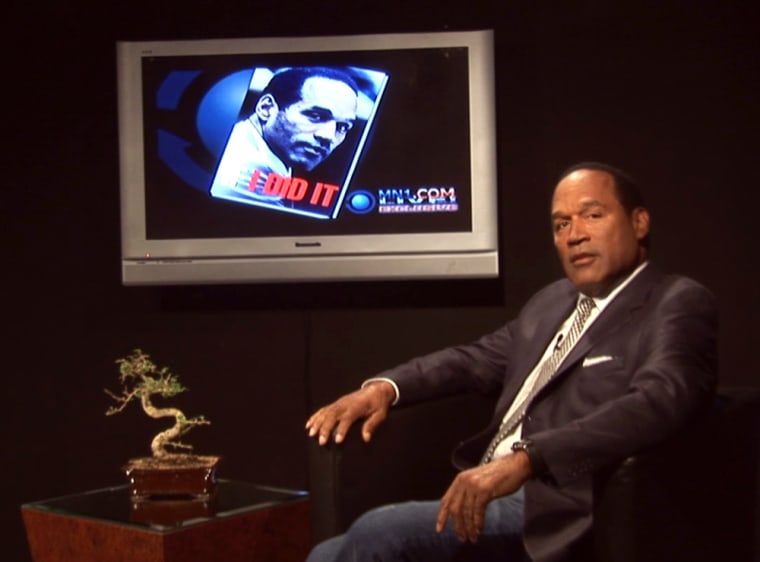In a nation that largely despised him, O.J. Simpson always had strong support within the black community, where polls showed a majority of people believed he was innocent of charges that he murdered his ex-wife Nicole Brown Simpson and her acquaintance Ronald Lyle Goldman outside her home in Los Angeles's Brentwood neighborhood in 1994.
But after a string of missteps by the former football star -- a heated 2003 argument with his teenage daughter in which she called police; a book, "If I Did It," that raised eyebrows last year; and a dispute over sports collectibles in Las Vegas this month that led to an armed-robbery arrest -- black opinion has shifted.
A Washington Post survey found that 40 percent of black respondents believe he is innocent of the murders, compared with 71 percent who felt that way around the time Simpson was acquitted in 1995. The change in black opinion brings African American views of Simpson's guilt closer to those of white people. In late 1995, 72 percent of white respondents said Simpson was guilty of murder, and 74 percent say they feel that way now.
‘Fed up with this guy’
The 31-percentage-point drop among black respondents is a head-turner, sociologists said, because African Americans were such steadfast supporters of the celebrity, cheering in some places when the verdicts were read.
"Blacks in the survey are probably saying, 'We're sort of fed up with this guy,' " said Earl Smith, a Wake Forest University professor who wrote "Race, Sport and the American Dream." "If you look at his actions since the murder, they've all been bad decisions, just constant."
Carl E. Enomoto, a New Mexico State University professor who wrote a book on public attitudes toward Simpson, agreed. "There's just been a lot of things that have happened, that robbery arrest and the tape on TV shows the rage he's capable of," Enomoto said. "He's such an emotional person that you can set him off pretty quickly. People are seeing all this and starting to change their opinions."
John Hull, 44, an African American living in Memphis, said he believed that Simpson was innocent in 1995, but has shifted his view. "I think people's views have changed because O.J. has changed," he said. "It's his behavior, his demeanor. His reputation is shot to hell. That could have been his behavior before but nobody knew."
Another black man, Ronald King, 56, of Nashville, said he saw Simpson less as a black man and more as a black eye on his community.
"O.J. is crazy," he said. From the book to the hotel melee, he said, "It's stupidity. He's a stupid man."
A symbol of racial inequality
At the time of his acquittal, many commentators asserted that many black people saw Simpson as a symbol of the unfair treatment that African Americans feel they receive from the criminal justice system. A 1995 Post poll, for example, found that nearly nine in 10 African Americans said blacks and other minorities do not receive equal treatment in the criminal justice system. The latest survey indicates that distrust has not substantially dissipated. Nearly half of black respondents believe that Simpson is being unfairly targeted by police. Seventy-three percent of white respondents said otherwise.
The Post poll was conducted by telephone over five days ending Sunday, among a national random sample of 1,062 adults. The margin of sampling error for the full survey is plus or minus three percentage points, it is minus eight points for the African American sample.
In accompanying street interviews with African Americans, few thought their views on the issue had evolved. Many said they felt Simpson was innocent 12 years ago and still do now. Others said their belief that he was guilty is unchanged.
Evan Holland, 26, of Los Angeles said she cheered the verdict. "At the time it was not far from the L.A. riots where police officers were acquitted of beating Rodney King," she said. "For me, it was like we need some justice, we need some support, we need a win. I didn't think he did it." She still doesn't.
Greg Thornton, 43, of Oxon Hill said the prosecution of Simpson is a media frenzy driven by white-controlled news media. "I felt relieved that he was let off," Thornton said. Justice for black people is rare, he said, citing the slow response to help New Orleans after Hurricane Katrina and the prosecution of six black teenagers in Jena, La.
But Carlton Land, 64, of Houston disagreed. "I thought he was guilty, and I still do," he said. "All this mess he's in now, we just want to say, 'O.J., you need to go sit down somewhere.' "
Polling director Jon Cohen and polling analyst Jennifer Agiesta contributed to this report.
